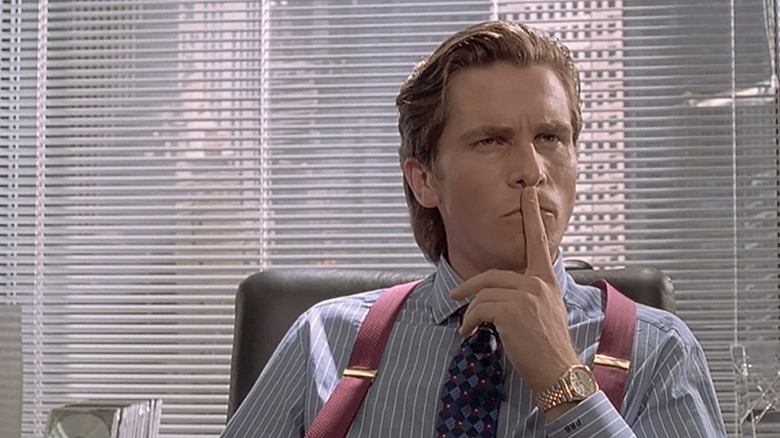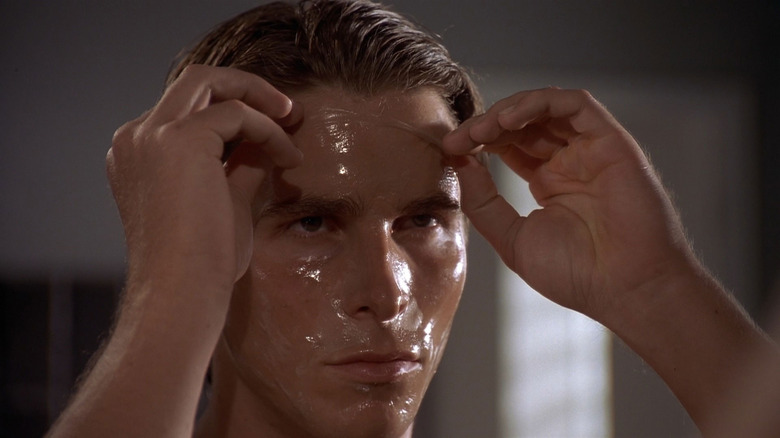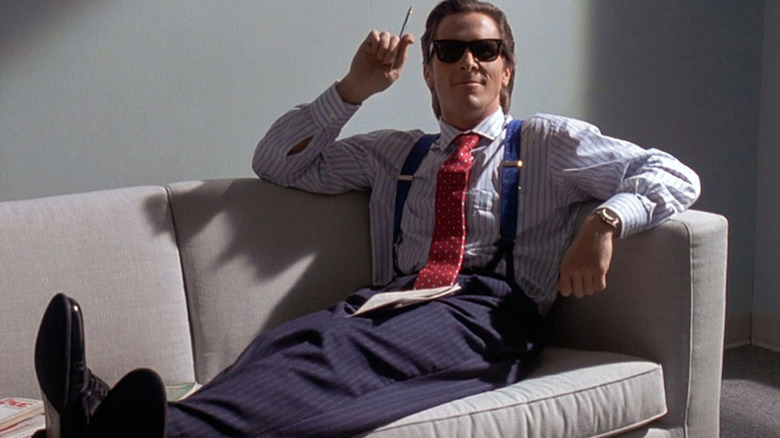Christian Bale Faced Real-Life Threats Over His Role In American Psycho
Mary Harron's 2000 film "American Psycho," based on the notorious novel by Bret Easton Ellis, is not just one of the scarier films of its decade, but also may have proven to be one of its more important. Focusing on a handsome, callow, posturing ultra-yuppie named Patrick Bateman (Christian Bale), "American Psycho" explores the depths of emptiness and the pathetic longing for depravity in the heart of America's wealthy. This is a world where exercise and skincare are more important than thought, where sex is to be had while admiring one's self in a mirror, and apocalyptic jealousies can arise over the slight differences in 29-year-old plain white males' plain white business cards. Bateman only seems to have two emotions: narcissism and disgust. When another human being stands in the way of his gross, everyday ambitions toward shallowness, he will murder them without compunction. Most of his targets are women and sex workers, but he also kills a homeless man as well as a co-worker (Jared Leto) who looks kinda like him.
He isn't human. And he's the perfect avatar for unsophisticated Reagan-era ambition and petty wealth worship. It's notable to look at a one-time yuppie lord like Donald Trump — namechecked in the film — and see that he is 100% from this world. Harron sees the ultra-male world of '80s stock traders and sees a pitiful clubhouse full of idiot boys having pissing contests.
The original Ellis book was published in 1991, right at the tail end of yuppie ascendency, and was noted at the time for its extreme violence and potential for ending the author's career. Similar concerns arose around the film, and Bale, in a recent video interview with GQ, recalls how he was once threatened for his association with the project.
The criticism
The book of "American Psycho" was largely lambasted at the time, with some critics feeling that it was an endorsement of the violence inside. Feminist icon and essayist Gloria Steinem was quoted in the Los Angeles Times in 1990 as feeling its sexist attitudes and depictions of harm inflicted on women to be outwardly misogynist. When it came time to adapt the book to screen, Harron and her co-screenwriter Guinevere Turner (an actress known for "Go Fish" and "The Watermelon Woman") left the violence intact, but most assuredly did not once depict Patrick Bateman as sympathetic, or even human.
That didn't prevent some people from wholly objecting to the film being made. In the GQ interview, Bale reveals that he was threatened for taking part.:
"I remember somebody threatening me on the street because some people did object to the film getting made and all that. And I remember people saying they were gonna do me harm and stuff like that, you know? And I would actually go, like — I remember somebody warned me, must have been a friend of mine who was crazy early on the internet."
Bale brushed off the threat at the time. The phenomenon of internet threats, tactical bullying, and doxxing hadn't yet made their way into the medium's lexicon. Thanks to advances in technology, harassing actors has now become disappointingly easy. In 1999, during the filming of "Psycho," such threats were seen as potentially harmless and risible. Bale was so resolute, in fact, that he tempted fate a little bit.
'I'm going to that alley.'
Bale wasn't on the internet yet — this was 1999, the days of dial-up — so it took a friend to go scouring for threats. As Bale discovered, one plaintiff in particular even claimed that he wanted to hurt the actor. The actor responded to one particular threat by essentially calling their bluff. When someone actually revealed details of his personal life and claimed that he would meet Bale in public to do terrible things to his brain, Bale was more curious than frightened. Possessed of bluster, Bale wanted to confront the guy. He said:
"[My friend said] 'There's some person, and they know where you walk every single day and you go down this back alley and they say that they're gonna jump on you and they're gonna rip your cerebral cortex out of your head. So please don't go down that alley.' So of course I was like, I'm going to that alley, I wanna see what happens. Unfortunately, nothing. I kept walking up and down it going, 'Where are they?' Come on, what's ... [laughter]? But nothing ever happened."
Bale, to this day, remains unharmed, other than the extreme diets he may put himself on for films like "American Hustle" or "Rescue Dawn," or box office harm he experiencing from notorious bombs like the recent "Amsterdam." Regardless, he remains one of the better, more interesting actors of his generation, and continues to make fascinating choices. May he continue ever to skirt controversy.


